Teeth whitening strips have become a popular at-home solution for achieving a brighter smile. They are convenient, affordable, and easy to use. However, to get the most out of your whitening strips, it’s important to follow the correct preparation steps. One of the most common questions people ask is: Should you brush your teeth before applying whitening strips? This article will explore this question in detail, providing you with expert advice on how to prepare your teeth for whitening strips and ensure the best possible results.
Understanding How Whitening Strips Work
Before diving into whether you should brush your teeth before using whitening strips, it’s essential to understand how these products work. Whitening strips are thin, flexible pieces of plastic coated with a peroxide-based gel. When applied to the teeth, the gel penetrates the enamel and breaks down stains, resulting in a whiter appearance.
The effectiveness of whitening strips depends on several factors, including the concentration of the bleaching agent, the duration of use, and how well the strips adhere to your teeth. Proper preparation, including brushing your teeth, can significantly impact the outcome.
The Importance of Preparing Your Teeth for Whitening Strips
Preparation is key to ensuring that whitening strips work effectively. If your teeth are not properly prepared, the strips may not adhere well, and the bleaching agent may not penetrate the enamel as effectively. This can lead to uneven whitening or reduced results.
Why Brushing Matters
Brushing your teeth before using whitening strips serves several important purposes:
Removes Surface Debris: Brushing removes food particles, plaque, and other debris from the surface of your teeth, allowing the whitening gel to make direct contact with the enamel.
Enhances Adhesion: Clean teeth provide a better surface for the strips to adhere to, ensuring they stay in place during the treatment.
Prevents Staining: Brushing helps eliminate surface stains that could interfere with the whitening process.
Should You Brush Your Teeth Before Applying Whitening Strips?
The short answer is yes, you should brush your teeth before using whitening strips. However, there are some important considerations to keep in mind to ensure you’re doing it correctly.
Brush Gently with a Non-Abrasive Toothpaste
When brushing your teeth before applying whitening strips, it’s important to use a non-abrasive toothpaste. Abrasive toothpaste can create micro-scratches on the enamel, which may make your teeth more susceptible to staining after whitening.
How to Brush Properly:
Use a soft-bristled toothbrush to avoid damaging your enamel.Brush for at least two minutes, covering all surfaces of your teeth.Rinse thoroughly to remove any toothpaste residue.
Avoid Using Whitening Toothpaste Beforehand
While it might seem logical to use whitening toothpaste before applying whitening strips, this is not recommended. Whitening toothpaste often contains abrasive ingredients or low concentrations of bleaching agents, which can interfere with the effectiveness of the strips.
Why Avoid Whitening Toothpaste?
The abrasives in whitening toothpaste can create a rough surface on your teeth, reducing the adhesion of the strips.The additional bleaching agents in whitening toothpaste may cause sensitivity when combined with the strips.
Floss Before Brushing
Flossing is an often-overlooked step in preparing for whitening strips. Food particles and plaque between your teeth can prevent the strips from making full contact with the enamel, leading to uneven whitening.
How to Floss Effectively:
Use dental floss to clean between all your teeth.Be gentle to avoid irritating your gums.Rinse your mouth after flossing to remove any dislodged debris.
What to Avoid Before Using Whitening Strips
In addition to brushing your teeth, there are certain things you should avoid before applying whitening strips to ensure the best results.
Avoid Eating or Drinking Stain-Causing Foods
Foods and beverages like coffee, tea, red wine, and dark-colored sauces can leave stains on your teeth. Consuming these before using whitening strips can reduce the effectiveness of the treatment.
Tips for Avoiding Stains:
Avoid consuming stain-causing foods and beverages for at least an hour before applying the strips.If you do consume them, rinse your mouth with water and wait at least 30 minutes before brushing and applying the strips.
Don’t Use Mouthwash Right Before Application
Some mouthwashes contain ingredients like alcohol or coloring agents that can leave a residue on your teeth. This residue can interfere with the adhesion of the whitening strips.
When to Use Mouthwash:
If you use mouthwash, do so at least 30 minutes before applying the strips.Rinse your mouth thoroughly with water after using mouthwash to remove any residue.
Post-Whitening Care Tips
To maintain the results of your whitening strips, follow these post-whitening care tips:
Avoid Stain-Causing Foods and Beverages
Limit your consumption of coffee, tea, red wine, and other stain-causing substances.
Maintain Good Oral Hygiene
Brush and floss your teeth regularly to prevent new stains from forming.
Use a Straw for Beverages
When drinking stain-causing beverages, use a straw to minimize contact with your teeth.
Conclusion
Brushing your teeth before using whitening strips is a crucial step in ensuring the effectiveness of the treatment. By removing surface debris, enhancing adhesion, and preventing staining, proper brushing sets the stage for optimal results. Remember to use a non-abrasive toothpaste, avoid whitening toothpaste beforehand, and floss to ensure your teeth are fully prepared.
By following these guidelines and using whitening strips correctly, you can achieve a brighter, more confident smile from the comfort of your home. Always consult with your dentist if you have any concerns or questions about using whitening strips, especially if you have sensitive teeth or existing dental issues. With the right preparation and care, you can enjoy the benefits of a radiant smile.

